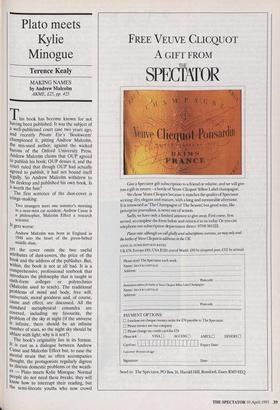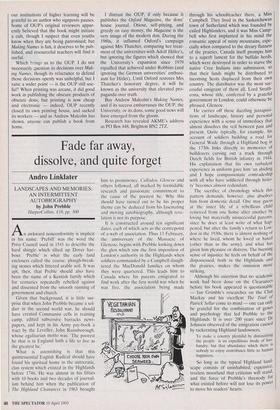Plato meets
Kylie Minogue
Terence Kealy
MAKING NAMES by Andrew Malcolm AKME, £25, pp. 425 This book has become known for not having been published. It was the subject of a well-publicised court case two years ago, and recently Private Eye's 'Bookworm' Championed it, pitting Andrew Malcolm, the mis-used author, against the wicked barons of the Oxford University Press. Andrew Malcolm claims that OUP agreed to publish his book; OUP denies it, and the court ruled that though OUP had actually agreed to publish, it had not bound itself legally. So Andrew Malcolm withdrew to his desktop and published his own book. Is It worth the fuss?
The first sentence of the dust-cover is cringe-making: Two strangers meet one summer's morning in a near-miss car accident; Andrew Cause is a philosopher, Malcolm Effect a research scientist.
It gets worse: Andrew Malcolm was born in England in 1948 into the heart of the green-belted middle class,
Yet the cover omits the two useful attributes of dust-covers, the price of the book and the address of the publisher. But, Within, the book is not at all bad. It is a Fnmprehensive, professional textbook that Introduces the philosophy that is taught in stxth-form colleges or polytechnics (Malcolm used to teach). The traditional Problems of mind and body, free will, universals, moral goodness and, of course, cause and effect, are discussed. All the standard metaphysical conundra are Covered, including my favourite, the Problem of the sky at night (if the universe Is infinite, there should be an infinite number of stars, so the night sky should be ablaze with light; why is it not?)
The book's originality lies in its format. It is cast as a dialogue between Andrew Cause and Malcolm Effect but, to ease the mental strain that so often accompanies thought, the protagonists regularly digress to discuss domestic problems or the weath- er — Plato meets Kylie Minogue. Normal People do not need these breaks, they will know how to interrupt their reading, but the semi-literate youths who now crowd
our institutions of higher learning will be grateful to an author who signposts pauses. Some of OUP's original reviewers appar- ently believed that the book might initiate a cult, though I suspect that even youths know when they are being patronised; but Making Names is fun, it deserves to be pub- lished, and resourceful teachers will find it useful.
Which brings us to the OUP. I do not necessarily question its decisions over Mak- ing Names, though its reluctance to defend those decisions openly was unhelpful, but I raise a wider point — is the OUP still use- ful? When printing was arcane, it did good work in publishing the obscure products of obscure dons, but printing is now cheap and electronic — indeed, OUP recently closed its own printing house, and sacked its workers — and as Andrew Malcolm has shown, anyone can publish a book from home. I distrust the OUP, if only because it publishes the Oxford Magazine, the dons' house journal. Otiose, self-pitying, and greedy on easy money, the Magazine is the very image of the modern don. During the 1980s, it inflamed Oxford's campaign against Mrs Thatcher, comparing her treat- ment of the universities with Adolf Hitler's, but ignoring the figures which showed that the University's expansion since 1979 equalled that achieved under Robbins (and ignoring the German universities' enthusi- asm for Hitler). Until Oxford restores Mrs Thatcher's honorary degree, it will be known as the university that elevated pro- paganda over truth.
Buy Andrew Malcolm's Making Names, and if its success embarrasses the OUP, the University, or its dons, some good news will have emerged from the gloom.
Research has revealed AKME's address as PO Box 448, Brighton BN2 2TZ.



























































 Previous page
Previous page